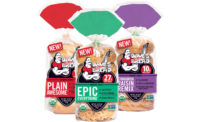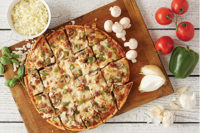![]()
Upping the Ante
Premium has been almost priceless for the Sara Lee Bakery Group in the bread aisle. In about two years, the St. Louis-based baking group has taken the venerable, premium image of the Sara Lee brand, leveraged it into the bread aisle and built it into a $125 million annual business.
Today, the 13-product line includes not only Sara Lee Fresh baked bread, but also a variety of buns and rolls introduced over the past 20 months. According to the company, the success of the Sara Lee line has more than offset declines in its regional and private-label-branded business as it “continues to enhance the product mix of its U.S. fresh business,” the company said in a release earlier this month, announcing fourth-quarter and fiscal 2004 results.
In fact, in the fourth quarter, sales of Sara Lee-branded bread rose 9%, the company reported. When including sales of its regional brands and private-label products, sales increased 4%. Certainly, going premium is the price for success in these challenging times.
“The most recently launched Sara Lee bread varieties, health-oriented fresh breads, such as Delightful Wheat, Delightful White and Heart Healthy Multi Grain, continued their advance during the fourth quarter,” the company noted. “Building on this success, new bagel varieties were launched at the beginning of fiscal 2005.”
For the Sara Lee Bakery Group, the story about nutrition needs to be a simple one, Peter Reiner, senior vice president of marketing and R&D at the company, told SF&WB magazine earlier this year.
“We believe that whole grain is becoming increasingly important to consumers,” he said. “The whole health-and-wellness issue is confusing consumers. One day, they hear that something is healthy. The next day, it’s not. We’re trying to simplify the message. We want to make it simple as possible.”
In Sara Lee’s case, that message involved labeling its products as “heart healthy.” When Sara Lee introduced its Sara Lee Delightful bread with lower carbohydrates and calories, the company also rolled out three Sara Lee Heart Healthy breads — one new multigrain bread and two others from its line of Sara Lee-branded breads — specifically its classic and home-style wheat.
Compared to the mindset of consumers 20 or 22 months ago, Reiner said, whole grains have become more front of mind with consumers making the heart-healthy message more on-trend. Bakers just need to communicate their messages better to get more consumers to buy into these better-for-you products. That’s what Sara Lee did.
“We wanted a straightforward message of ‘heart healthy.’ We wanted to be straightforward about the benefits of these products,” Reiner explained. “It’s simply descriptive, not fancy or convoluted. There are more whole grains in these bread products that make them better for you.”
Over the last few years, the Flowers Bakeries Group has also found success by promoting premium products in the soft bread segment. Despite all of the turmoil in the industry, Flowers Bakeries Group has continued to be a steady performer. Flowers noted that Nature’s Own has become a $350 million brand, making it the top-selling soft variety bread in the nation, while Cobblestone Mill is quickly heading toward the $100 million mark in annual sales. The company also produces white breads under such regional brands as Sunbeam, Bunny, Mary Jane, Dandee, Betsy Ross and ButterKrust.
Last year, Flowers launched the Nature’s Own Healthline Wheat ’n Fiber bread, which has only 7 gm. of carbohydrates per slice. Company officials describe the product as the “most successful new-product introduction in the history of our company.” More recently, in an effort to leverage the broader health-and-wellness trends, the company came out with Nature’s Own Wheat ’n Soy and said that additional carb-conscious products are in the works. Flowers’ Nature’s Own Healthline brand also includes sugar-free and light breads.
In the bread aisle, healthful and wholesome products — and not necessarily low-carb — have been selling at a brisk rate over the last year as consumers shift away from commodity-priced white breads.
For decades, Pepperidge Farm has been a leader in the premium-bread segment. According to Jay Gould, the company’s president, Pepperidge’s bakery business has been “awesome” this year.
“I don’t use that word too lightly,” Gould told SF&WB magazine earlier this year. “The bakery category is down about 1%, and our business is up 10%, if you exclude Wal-Mart. If you include Wal-Mart, it’s up 13% this year.”
Today, the Norwalk, Conn.-based company seems to be perfectly positioned to weather today’s tough business. It produces super-premium baked goods, many of which are made with whole grains — and those are two of the fastest-growing segments in the bread aisle.
“We have benefited from two big consumer trends,” Gould said. “One, consumers are trading up. And two, people are buying healthier bread products. People are continuing to shift away from white bread into healthier products.”
Pepperidge Farm Natural Whole Grain breads, for instance, are rich in whole grains and a good source of fiber. Each package features the American Heart Association’s Heart Check mark that identifies heart-healthy foods. Varieties include 100% Whole Wheat, Multi-Grain, Nine Grain, Crunchy Grains, Honey Oat, German Dark Wheat, Hearty Bran and Oat Bran. Overall, the company produces more than 50 varieties of breads and rolls.
In addition to adjusting its strategy, Pepperidge Farm recently rolled out Carb Style products, which are available in White, Soft 100% Whole Wheat and 7-Grain varieties. Each product offers 5 gm. of net carbs per slice. Suggested retail price is about $2.89.
“Certainly, low-carb products are a demand-driver today, and many consumers are making purchasing decisions based on carbohydrate claims,” Gould explained. “We felt we should play in it in the short term. We were late in getting into it, quite frankly, because we were not happy with the quality of the products that we could make. It took us about a year to get a quality product that we were really happy with.”
Gould predicted that the low-carb movement would impact bakery sales for at least the next 12 to 18 months. “We don’t see an abatement in this demand,” he noted. “Beyond 18 months, it’s hard to predict, quite frankly.”
Recent studies released over the last two months suggest that the low-carb craze may have peaked. The number of people on low-carb diets has sunk into the single-digits. Sales of some starches and other ingredients in low-carb products have ebbed slightly of late, a sure sign that the trend has leveled off, if not slowed down. Specialty stores that cater to the carb-conscious are reporting softer sales. In some cases, these low-carb shops are shutting their doors.
No matter what the current trend is, in the long run, the Atkins effect could turn out to be the best thing for the baking industry since sliced bread, noted Mike Marcucci, CEO of Chicago-based Alpha Baking Co., at this year’s American Society of Baking conference.
“For decades, the commercial-baking industry has been over-relying on what I like to refer to as the Rodney Dangerfield of the food chain. Yes, white bread,” he said. “Particularly, private-label white bread has turned into the loss leader from hell. Go into more stores in America, and you’ll probably pay more per ounce for bottled water than you will for white bread. The profit margins on this business have been declining for years.”
When the dust settles, he added, wholesale bakers will be selling more profitable whole-grain, low-carb and variety breads and less white bread, particularly private label, which is almost impossible to make money on.
“It’s much healthier for the consumer, and it’s much, much healthier for the baker,” Marcucci explained. “If we don’t panic and, instead, give the consumer what they want — which is incidentally what’s much better for them — the good old days could yet return.”
For many bakers, the latest better-for-you bread introductions are addressing a whole slew of health issues. In the Pacific Northwest, for instance, Portland-Ore.-based United States Bakery, also known as Franz Family Bakeries, came out with the Smart Nutrition brand, which is now comprised of at least nine varieties of breads, rolls and English muffins. Its 6-4-60 Wheat Multigrain bread has 6 gm. net carbs, 4 gm. protein and iron and 60 calories. The bread has no trans fat high-fructose corn syrup and is a good source of fiber, calcium, iron and folic acid.
The Smart Nutrition line also offers Net 4 Reduced Carb loaf with 4 gm. net carbs per serving, Healthy Carb Whole Grain bread, Sugar Free 100% Whole Wheat, Healthy Oat bread and reduced-carbohydrate hamburger buns, hot dog buns, bagels and English muffins.
No kidding. Children Influence $40 Billion in Spending
While bakers are re-adjusting their mix toward more premium breads, they shouldn’t ignore young consumers, who are the biggest consumers of white bread.
According to Mintel, a global market research firm, children between ages 4 and 12 were responsible for some $40 billion in spending in 2002. By 2008, the company projects that kids will influence $51.87 billion in sales.
Recognizing this trend, the food industry dolled out an estimated $13 billion in marketing to children last year, Mintel reports, and that money is going to good use. Kids and teens eat an average of 4.4 times a day. In addition to lunch and dinner, children like to snack either during school through vending machines or after school often with a “one-handed” snack, the firm notes.
Depending on their ages, children eat different foods. Kids under 12 eat a wider variety of snacks than older teens. In addition to candy and salted snacks, they are likely to eat a wider variety of snacks, including nutritional ones.
Teens, who are more influenced by their peers than their parents, eat less fruit and more chips, candy and fast food, Mintel says.
| Fresh Bread (For 52 weeks ending June 13, 2004) | ||||||
| Rank | Brand | Dollar Volume (in millions) | % Change | Dollar Share | Unit Sales (in millions) | % Change |
| 1. | Private Label | $1,419.7 | -6.1 | 25.2 | 1,637.0 | 38.1 |
| 2. | Wonder | $300.7 | -5.0 | 5.3 | 205.6 | 4.8 |
| 3. | Oroweat | $250.6 | +0.3 | 4.5 | 118.1 | 2.7 |
| 4. | Nature’s Own | $214.5 | +5.2 | 3.8 | 138.3 | 3.2 |
| 5. | Arnold | $183.4 | +12.8 | 3.3 | 104.8 | 2.4 |
| 6. | Home Pride | $160.1 | -3.5 | 2.8 | 102.1 | 2.4 |
| 7. | Sunbeam | $145.9 | -10.1 | 2.6 | 118.9 | 2.8 |
| 8. | Sara Lee | $120.6 | +37.1 | 2.1 | 76.1 | 1.8 |
| 9. | Pepperidge Farm | $87.4 | -1.3 | 1.6 | 43.0 | 1.0 |
| 10. | Merita | $83.0 | -8.3 | 1.5 | 61.0 | 1.4 |
| Total* | $5,632.3 | -1.2 | 100.0 | 4,297.9 | 100.0 | |
| *Including brands not shown SOURCE: Information Resources Inc., Supermarkets, Drug. (No Supercenters). | ||||||



